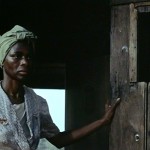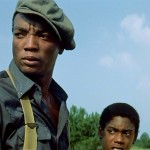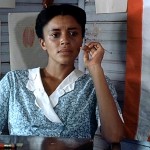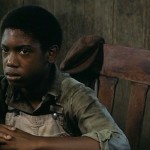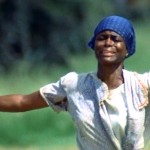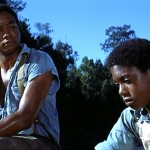
Sounder – 1972
This was a very well-made movie. The casting was great, the story was inspiring, the cinematography and art direction were wonderfully realistic, and the social significance was important. It was a film which celebrated the triumph of the human spirit. It confronted issues of racism in a positive way, and did so without being preachy or accusatory. It wasn’t dark or depressing, though it certainly wasn’t fun or light-hearted.
Child actor Kevin Hooks played the part of David Lee Morgan, the eldest son in a poor family of sharecroppers in Louisiana in 1933, right in the middle of the Great Depression. The film opens with him and his father, Nathan, played by Paul Winfield, hunting in the woods for a raccoon so that the family will have meat to eat. With them is their dog, Sounder, so named because of his loud barking. Waiting for them at their tiny cabin is Nathan’s wife, Rebecca, played by Cicely Tyson, and the two younger children, Earl and Josie Mae, played by Eric Hooks and Yvonne Jarrell.
Well, to make a long story short, the family is starving, so Nathan steals food to feed them. He is arrested and sentenced to a year of hard labor. The film’s main plot is about how David Lee must become the man of the house and how Rebecca and her three children must band together to sharecrop the land without Nathan.
I learned that there were two big differences between the book upon which the movie was based and the film. First, the dog, Sounder, is cruelly and casually shot during Nathan’s arrest. The main body of the book focuses how the family rallies around Sounder to keep him alive, just as they hope for Nathan’s survival and safe return. The film is focused on the family struggling to keep the farm and themselves alive. Second, in the book, when Nathan is eventually released and returns home, both he and Sounder die within a few months. In the film, they both live.
But in both mediums, the remarkable story of the character of David Lee growing up and becoming a man remains the same. Both Paul Winfield and Cicely Tyson were nominated for Best Actor and Best Actress, respectively. True, those nominations were deserved, but I thought Kevin Hooks also did a pretty good job, especially since he was really the main character of the film. Everything seemed to be told from his perspective and Hooks did a fine job of keeping the emotional content of the film moving forward.
As I mentioned, the subject of racism was given its fair share of the plot. The simple act of thievery should not have been worthy of the unusually harsh sentence that the character of Nathan was forced to endure. But the fact that he was a colored man being sentenced by a racist, white judge, seemed to guaranty unfair treatment. After he was taken to prison, they would neither let his wife have any contact with him, nor would they tell the family what prison camp he would be assigned to.
After a kindly white lady named Mrs. Boatwright, played by Carmen Matthews, breaks the law to learn where Nathan is being sent, David Lee goes on a journey to find his father. Along the way he meets and starts a friendship with a black school teacher who takes him in and takes an interest in his education. Janet MacLachlan played the school teacher, Camille Johnson, and did a wonderful job.
For the most part, the movie kept with the trend of the time in film-making in that it seemed to prize realism. Director, Martin Ritt, did a great job of keeping the plot and the art direction grounded in the real world. The characters were well-written and believable, and the actors were all very well-cast. I’d like to give a special shout out to Cicely Tyson for a great performance. She really seemed to embrace her character and gave her a strength that was inspiring to watch.
And speaking of being inspired, the message that the end of the film left me with was both uplifting and powerful. David Lee has been invited to spend the school year with Miss Johnson and attend her school. He almost refuses to go because with his father’s return, he wants to stay and help him with the farm. But Nathan’s little speech, telling David Lee to go was emotionally stirring. He says, “That’s what I’m gonna do with this trouble in my leg. I’m gonna beat it. Ain’t nothing left for me to do but to beat it. But that’s what I want you to do. I want you to beat the life they got all laid out for you in this place, cause there ain’t nothing, there ain’t nobody here but them bastards that sent me… Son, don’t get too used to this place, cause wherever you is, I’m gonna love you.” I’ve always liked those scenes in films that say “My life is here because I have responsibilities, but you have a chance to make a better life for yourself. I mean to see you get that chance. If you do, you’ll make all my hard work mean something.” If that isn’t inspirational, then I don’t know what is.

